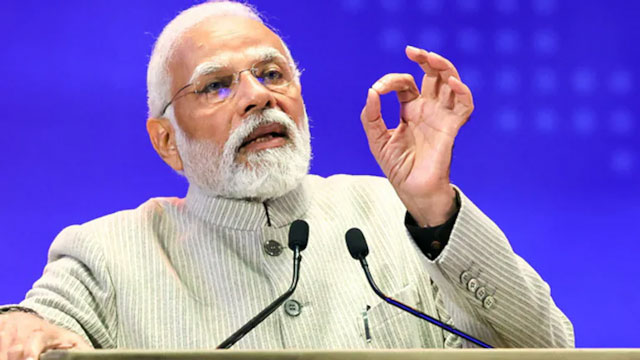Daijiworld Media Network- New Delhi
New Delhi, Aug 17: Prime Minister Narendra Modi on Sunday appealed to states to extend full cooperation in implementing the proposed next-generation Goods and Services Tax (GST) reforms, which the Centre aims to roll out ahead of Diwali.
Addressing a public event after inaugurating two expressways, the prime minister said the draft proposal of the new GST framework has been circulated among states. He urged them to complete the process quickly so that the festive season brings a “double bonus” for citizens.

“The objective of this reform is to simplify GST and revise tax rates. This will benefit the poor, middle-class, and both small and big businesses,” the PM said, recalling that he had first announced the plan in his Independence Day address from the Red Fort.
Under the proposal, the current four-slab structure of 0, 5, 12, 18, and 28 per cent will be replaced by a two-slab regime of 5 and 18 per cent, along with a special 40 per cent bracket for demerit goods like tobacco, gutka, pan masala, and online gaming.
If approved by the GST Council, the new system will move 99 per cent of items in the 12 per cent category, including butter, fruit juices, and dry fruits, to 5 per cent. Similarly, electronic appliances such as ACs, TVs, washing machines, and cement will shift from the 28 per cent bracket to 18 per cent.
The prime minister also linked the reform push with his call for ‘vocal for local’, urging citizens and traders to prefer Indian-made goods. “If you are Indian, buy what is made in India,” he said, adding that every such purchase strengthens the hands of the poor and boosts the domestic economy.
Citing examples of India’s self-reliance, Modi highlighted the country’s success in mobile phone manufacturing, UPI’s emergence as the world’s largest real-time payment platform, and the rising global demand for Indian-made rail coaches.
The GST Council is likely to meet next month to deliberate on the proposal, which comes after months of discussions. The Centre is hopeful that the rationalisation of rates will not only simplify compliance but also give a push to consumption despite initial revenue concerns.